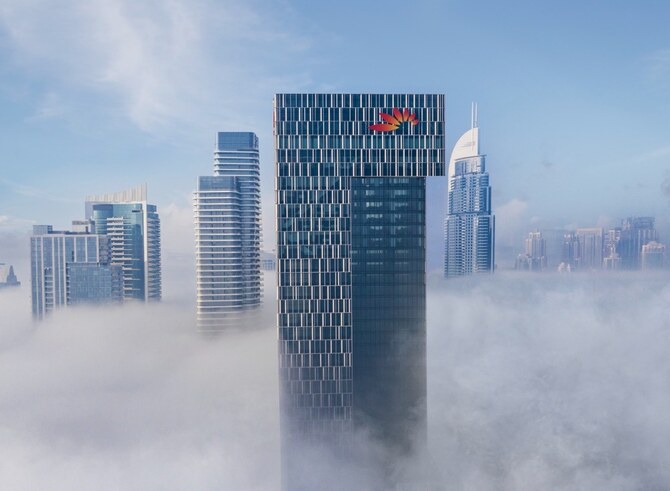RIYADH: Artificial intelligence is transforming the banking industry by creating seamless customer experiences, automatically detecting fraudulent activity, and completing time-consuming tasks normally performed by humans.
According to a report published this year by McKinsey, generative AI could add between $200 billion and $340 billion a year in value across the global banking sector, largely through increased productivity.
Earlier this year, Riyad Bank announced the launch of its new “Center of Intelligence,” which will introduce AI technologies and services to the Saudi banking sector.
Using machine learning and modeling, the center will offer a cutting-edge environment for AI-driven research, innovation and analysis. It will also use machine-learning techniques and solutions to improve the efficiency and effectiveness of the bank’s investments and operations.

Mazen Pharaon, chief digital officer at Riyad Bank, called AI “a strategic asset and game changer” for the industry.
“It’s also instrumental in helping us offer exceptional financial services to our customers and financial performance to our shareholders,” he told Arab News.
AI offers significant advantages over traditional, human-led methods, including enhanced efficiency, accuracy and scalability, Pharaon said.
“It enables us to process large volumes of data rapidly, delivering insights that would be challenging to obtain through conventional techniques.
“AI also facilitates accelerated decision-making and personalized services, boosting customer satisfaction and driving innovation.
Opinion
This section contains relevant reference points, placed in (Opinion field)
“Additionally, AI helps us identify new business opportunities, reducing costs and improving risk management by identifying potential issues before they escalate.”
Money management has not been entirely handed over to the machines, however. AI-driven automated decisions at Riyad Bank are complemented by human oversight to guarantee accountability and ethical compliance.
“While AI excels at processing vast amounts of data and identifying patterns at scale, our experts are involved in reviewing and validating key decisions and their expected impact,” Pharaon said.
“This hybrid approach allows us to leverage AI’s power while preserving the essential human supervision and oversight in banking.”

Riyad Bank’s long-term vision is to extend AI across all business areas.
“Our aspiration at Riyad is to embed the use of AI, data science and advanced analytics in the bank’s DNA and overall processes,” Pharaon said.
Mashreq Bank, a privately owned bank based in the UAE, also uses AI-backed digital solutions, which analyze customer data to provide personalized financial recommendations and insights across various platforms.
Fernando Morillo, the group head of retail banking at Mashreq, believes AI will be integral to the future of banking services.
“We utilize AI in various ways to enhance customer experience and streamline operations,” Morillo told Arab News.
DID YOU KNOW?
• AI could add up to $340 billion annually to the global banking sector through increased productivity.
• Riyad Bank’s ‘Center of Intelligence’ will introduce AI technologies to enhance research, investments and operational efficiency.
•AI-backed digital solutions at Mashreq Bank improve customer experience, offer personalized financial advice and detect fraudulent activity.
“We have launched a chatbot in the UAE, which is also being rolled out to other markets. This AI-powered chatbot can understand customer intent, translate it into actions, and provide 24/7 support.
“Our AI-backed chatbot has the ability to handle more than 80 different scenarios, anticipating customer needs and proactively offering solutions.”
Because data protection is a growing concern for every business, Mashreq offers advanced encryption techniques to ensure secure data-sharing protocols, and conducts regular security audits to safeguard customers’ information.
“Additionally, we implement rigorous testing and validation of our algorithms to ensure they meet ethical standards and regulatory requirements.”

Mashreq Bank uses AI-backed digital solutions. (Supplied)
Morillo said the ability of machine-learning models to continuously adapt to recognize new fraud tactics significantly reduces the risk of fraudulent activities and enhances overall security for customers.
“AI algorithms help us in analyzing vast amounts of data in real-time to identify patterns and anomalies that may indicate fraudulent activity,” he said. “This allows us to detect suspicious transactions, prevent fraudulent account openings, and reduce false positives.”
But Morillo does not believe that AI will replace humans entirely. Indeed, employees will still be needed to review AI activities and make adjustments as needed.
“While AI can provide insights, recommendations, and even decisions, ultimately humans supervise these systems to ensure decisions are fair, accurate, and compliant,” he said.
“This oversight is essential for maintaining accountability and addressing any ethical concerns that may arise.”
















